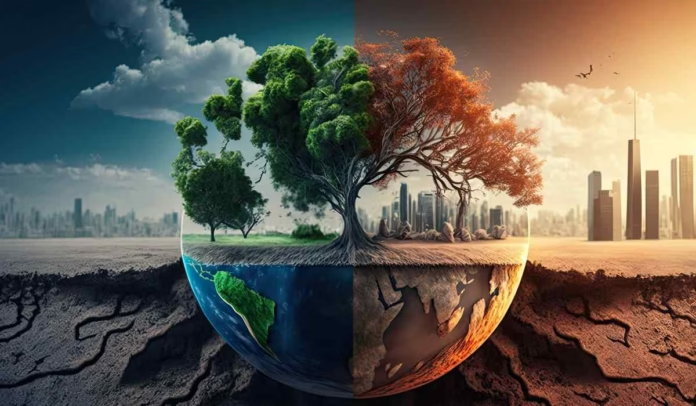Introduction: The Unspoken Longing
We live in strange times. Despite unprecedented comfort and connectivity, surveys show rising levels of anxiety and dissatisfaction. In this pressure cooker existence, many of us harbor a secret thought: What if the World Ends? Not in a dramatic supervillain way, but as a quiet release from modern life’s relentless demands.
This isn’t about wanting death it’s about wanting relief. Psychologists call it “eschatological fatigue,” that moment when your brain whispers: No more bills. No more emails. No more pretending. Let’s explore why this thought occurs, what it means, and how different traditions including Islam, frame our fascination with endings.
The Psychology Behind the Fantasy

1. Decision Fatigue in the Age of Too Much
Barry Schwartz’s “paradox of choice” explains how endless options paralyze us. When every life path requires constant self-curation, the fantasy of an ending represents freedom from choice.
2. The Meaning Crisis
Existential psychologists note we’re drowning in freedom but starving for purpose. The collapse fantasy becomes a misguided solution to this imbalance.
3. Digital Overload
Neuroscience shows our brains weren’t built for constant notifications. The imagined apocalypse offers the ultimate dopamine reset.
4. Community Collapse
As traditional social structures erode, we romanticize post-apocalyptic bonding. Research shows lonely people are more drawn to dystopian fiction.
Psychology Today – Why Do Some of Us Look Forward to the End of the World?
Cultural Catalysts: How Media Feeds Our Apocalyptic Imagination
Our entertainment reflects these undercurrents:

- The Last of Us and Station Eleven show the World Ends and post-collapse worlds with clearer purpose than modern life
- Mad Max fantasies reveal our craving for cathartic release from civilization’s tensions
- Survival games like The Long Dark satisfy our longing for tangible, meaningful work
These stories don’t glorify destruction – they reveal our hunger for simpler, more authentic existence.
Philosophical Perspectives on Endings
Stoic Premeditation
Ancient Stoics practiced imagining worst-case scenarios to build resilience. Our apocalypse fantasies may serve a similar psychological function.
Nietzsche’s Warning
His concept of eternal recurrence asks: “Could you bear to relive this life endlessly?” Many today would say no – revealing our deep dissatisfaction.
Buddhist Impermanence
The teaching that attachment causes suffering explains why collapse fantasies tempt us – they promise release from systems we feel trapped by.
Historical Context: We’ve Been Here Before
Apocalyptic thinking spikes during upheavals:
- 14th century: Black Death prompted similar soul-searching
- 19th century: Industrial Revolution birthed millenarian movements
- Cold War: Nuclear anxiety created its own fatalism
What’s unique today is facing multiple existential threats (climate, AI, pandemics) with global awareness of them all.
The Black Death: The Plague, 1331-1770
The Islamic Lens on Endings: A Different Kind of Hope
For Muslims, the World Ends isn’t just doomsday speculation – it’s part of a divine narrative. Unlike Hollywood’s bleak apocalypses, Islam frames it as transition rather than pure destruction.

Why It’s Not Just About Fear
The Qur’an’s dramatic imagery of the World Ends (crumbling mountains, boiling oceans) comes with a promise: what follows will be just. In a world where corruption often goes unpunished, this final reckoning can be weirdly comforting.
The Signs: From Familiar to Fantastic
Islamic tradition divides signs into:
Minor (already happening):
- Truth becoming rare (“fake news” era)
- Sky-high construction (Burj Khalifa anyone?)
- Wealth increasing but happiness decreasing
Major (yet to come):
- A false messiah figure with terrifying powers
- Jesus’ return (as a justice-bringer in Islam)
- The sun rising from the west – nature’s final alarm
The Practical Wisdom
The Islamic approach balances urgency with hope:
- Focus on what truly matters
- Build authentic connections
- Live ethically now, not later
It’s less “the end is nigh” and more “live well while time remains” – advice that resonates beyond religion.
When the Fantasy Turns Toxic
Watch for these red flags:
- Doomer paralysis (“Why try if we’re all doomed?”)
- Prepper extremism (Withdrawing from society entirely)
- Nihilistic hedonism (“Might as well party while the world burns”)
Healthier Alternatives to Apocalyptic Thinking
- Micro-Endings
Regularly “kill off” draining habits, relationships or obligations - Digital Apocalypses
Schedule regular tech collapses (weekend digital detoxes) - Community Fire Drills
Build local networks that could weather real crises - Existential Gardening
Focus on planting good that will outlast you
Conclusion: The End as Invitation
Our secret longing for the world to end isn’t about destruction – it’s a distorted cry for transformation. The Islamic perspective, psychological insights and historical patterns all point to the same truth: we don’t actually want oblivion. We want a life that feels worth preserving.
As philosopher Albert Camus wrote:
“The literal meaning of life is whatever you’re doing that prevents you from killing yourself.”
Our apocalyptic fantasies reveal what’s not working in modern life. The challenge and opportunity is to rebuild before any collapse becomes necessary.
Final Thought: The next time you fantasize about the world ending, ask: What specifically do I want to end? And what could I begin instead?


